(Review) “Blues for An Alabama Sky” At Playmakers: Superbly Crafted (5/5 Stars)
Chapel Hill, NC — A hot, muggy night on September 10 was perfect for a timeless production of “Blues for An Alabama Sky” at Paul Green Theater on the campus of the University of NC in Chapel Hill. Taking the audience back to the jazzy Harlem Renaissance, the opening of its 47th season was a massive hit for PlayMakers Repertory Company.
Cleage’s “Blues for an Alabama Sky”
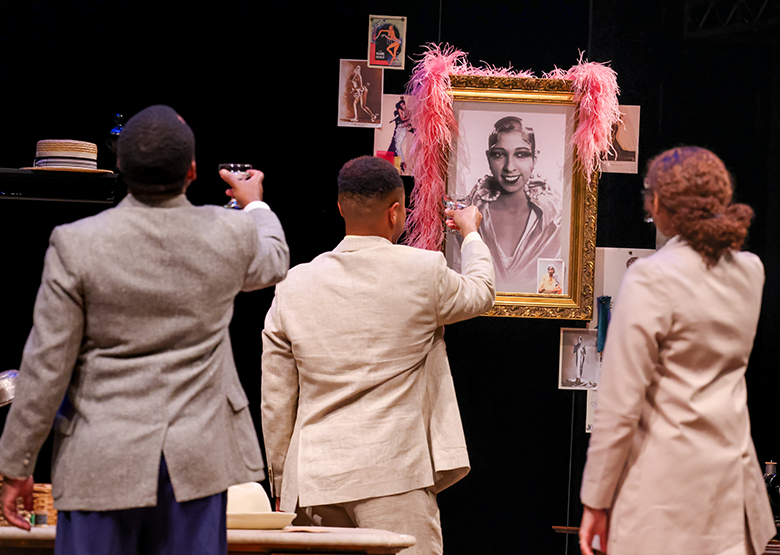
One often hears of the brilliance and romance that flowed out of the Harlem Renaissance; dancing, drinking, art, and fashion comprised the streets of large cities during the 1920s, especially in New York City. However, the Renaissance for working Americans wasn’t just full of sunshine and rainbows— one year after the Great Depression struck, countless individuals were hit with a plague of doubt and despair. Noted author and Playwright Pearl Cleage corrects the fantasy of what individuals perceive as the Harlem Renaissance; in a new production of “Blues for An Alabama Sky,” an expansive and riveting tale of struggle, lust, betrayal, and friendship takes center stage, and the Harlem Renaissance as people know it, becomes altered with the truth.
Whatever your understanding of the Harlem Renaissance, Pearl Cleage’s “Blues for an Alabama Sky” takes a modern approach to the 21st century and entwines it with the 1930 era. The characters, ordinary citizens of New York, are pitted against social forces that wreak havoc in their lives – racism, homophobia, overzealous religiosity, and sexism. Cleage beautifully draws out each character’s dreams within the black community and engulfs the audience in their story towards achieving freedom. As one of the most adventurous dramas right now on stage, the Playwright manages to draw the audience to relate to the critical issues the characters are experiencing. These include, among many others, homophobia and homosexuality; overzealous religious dogma and the men against homosexuality and birth control; prohibition, although ratified in 1919, making its way on stage with the excessive usage of booze and partying; racism, although segregation was not mentioned in the Play; feminist individuals and the emerging family planning movement with its offstage founder, Margaret Sanger, to create birth control options for women. Not to mention, the Great Depression was a widespread effect across the country, and times were getting harder for ordinary citizens every day.
What is the Harlem Renaissance?
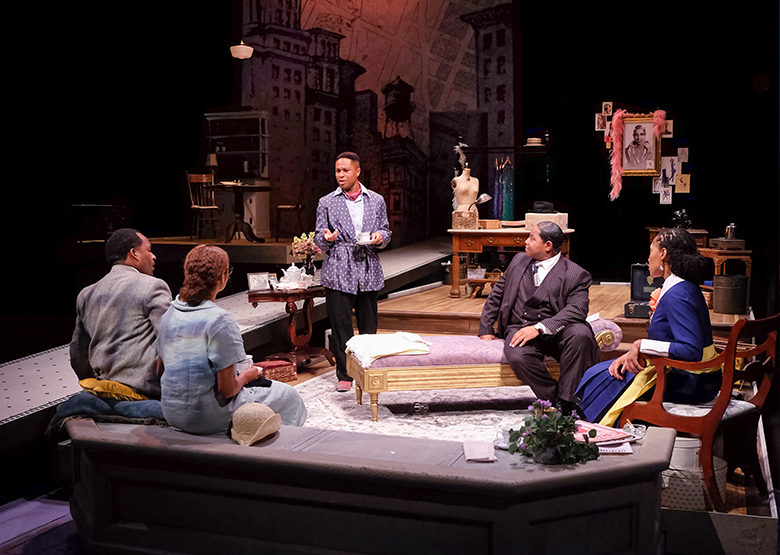
The Harlem Renaissance was the development of the Harlem neighborhood in New York City as an area for Black Americans to live in. As a result, a subsequent social and artistic explosion lasted from the 1910s through the mid-1930s. This period was the golden age for African Americans; literature, music, stage performance, art, and dancing manifested into a new era of rich culture. The movement laid the groundwork for later African American movements; while the movement was predominantly felt in New York City, the Harlem renaissance was felt across the United States, not becoming confined to a single state. Harlem became an attractive symbol for the African American community and served as the symbolic capital of a new cultural awakening.
Doors Opening
It was opening night for PlayMakers in Chapel Hill. Individuals were scrambling to get inside to celebrate the 47th season; college students, adults, and the elderly mingled amongst themselves in the common area before the doors opened. Snacks, candy, and sodas were consumed as they chatted amongst themselves, excited for the new year at PlayMakers.
“This is a fun time for my family and us. We like to bring the children out to these plays – it’s age-appropriate, the actors are phenomenal, and we get a sense of community whenever we come here. As a UNC student who graduated in 1999, I have always been drawn back to this place. My family and I can’t wait to see what other plays they have to offer this year,” Mr. Eugene stated.
Many people around this middle-aged man agreed, and a UNC student added her own input.
“I would have to agree. I’m not really into plays, but the last time I came here, I was really shocked at how much I loved it. You can just tell the workers, and the actors are very passionate about their performances; I think it’s contagious energy! I just can’t stop coming here,” a senior UNC student stated.
And they were right! As the lights dimmed in the beautiful theater, the audience began to clap, and quiet whispers of content were heard.
The Plot
The story revolves around Angel, a nightclub singer, “flozzy,” who had recently lost her job and gangster boyfriend. After a drunken incident, she moves in with Guy, an open homosexual and costume designer who has dreams of moving to Paris to sell his creations to Josephine Baker. Guy’s neighbor, who lives across the hall, Delia, has her own goal of starting up a clinic to advocate for reproductive rights; along her side, Sam, is a doctor who shares Delia’s values.
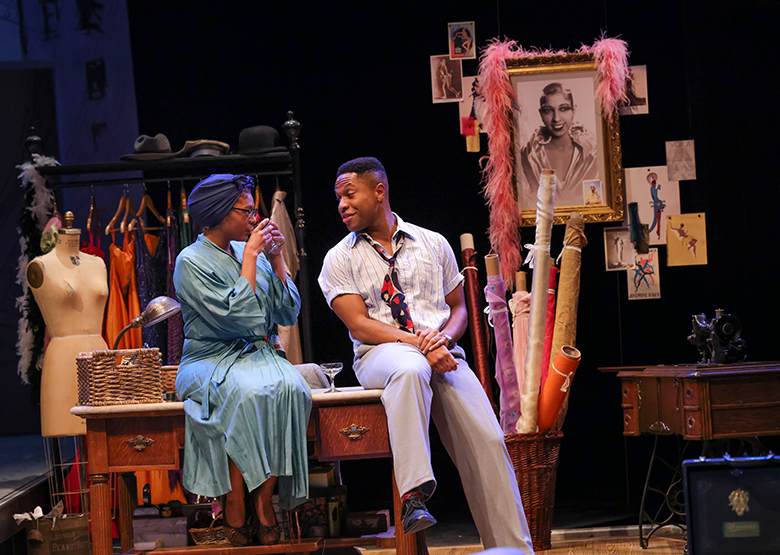
However, since the Great Depression, jobs have become scarce, and Guy and Angel are affected by the devastating effects. Barely able to afford their rent, Angel goes on a journey to find a man to take care of her financial situation. Unable to trust Guy, who promises Angel that they both will find a way to Paris and live richly, the young woman meets a young Alabama native. Leland Cummingham, a religious connoisseur, doesn’t take lightly the gay and reproductive rights Angel’s friends advocate for. A new decision arises for Angel that could destroy her friendship and fate— does she settle down, or does she become overcome with the desire for freedom?
Having a chance to speak to Jamar Jones, he had an interesting take on what the plot of this play meant for him.
“This play is a ply of our history. It was a special time in American history as well as black history. Being able to understand the period as well as getting to the hearts of the people is what this production is about– it’s teaching us to be open to who you are,” Jamar stated.
The characters
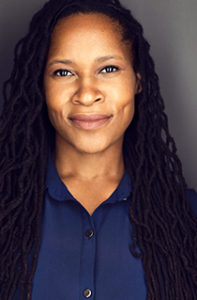
Angel Allen (Tia James), a woman portrayed as a floozy, is a free-spirited character. Extroverted and loud, she does whatever it takes to get her way. Currently out of her job after being fired and losing the gangster lover that takes care of her, she lashes out against the world. She is the definition of a dependent woman – unlike her friend Delia (Saleemah Sharpe), she seeks to be taken care of by a man and rejects the thought of ordinary women’s work. Against the idea of love, she throws herself at the first man who shows her interest; although she seems desperate throughout the play, she does have dreams of becoming a world-known singer. A bit of a selfish character, Angel takes advantage of her friends and her “lover,” whom she uses as a pawn for her own path to freedom.

On the opposite end of the spectrum, Delia Patterson (Saleemah Sharpe) is a reserved activist and conservative dresser currently studying typing. She is a quiet, hard-working woman who believes in women’s rights. She aims to persuade the Baptist church to support a family planning clinic that will allow women to take birth control to prevent pregnancies; a soft woman with no experience, she finds herself falling in love with Sam Thomas (Andre G. Brown).

Guy (Jamar Jones) is a homosexual costume designer who has dreams of heading to Paris to sell his designs to Josephine Baker. A man of courage and resilience, he often takes care of the boisterous Angel by allowing her to stay in his apartment. Because of his homosexuality, he is often subjected to abuse from other New Yorkers; however, in my opinion, the show’s best character, Guy, manages to stay optimistic and never gives up on his dreams of becoming something more than just a gay man.
Getting a chance to talk to Jamar Jones, who played Guy, he shared similar views of what the character Guy meant to him.
“I adore the character I was playing tonight. His determination, boldness, and unwavering belief in himself inspire me. As soon as I saw his script, I knew that I had to perform him – something about his strength in selfhood really stood out to me,” Jamar stated.
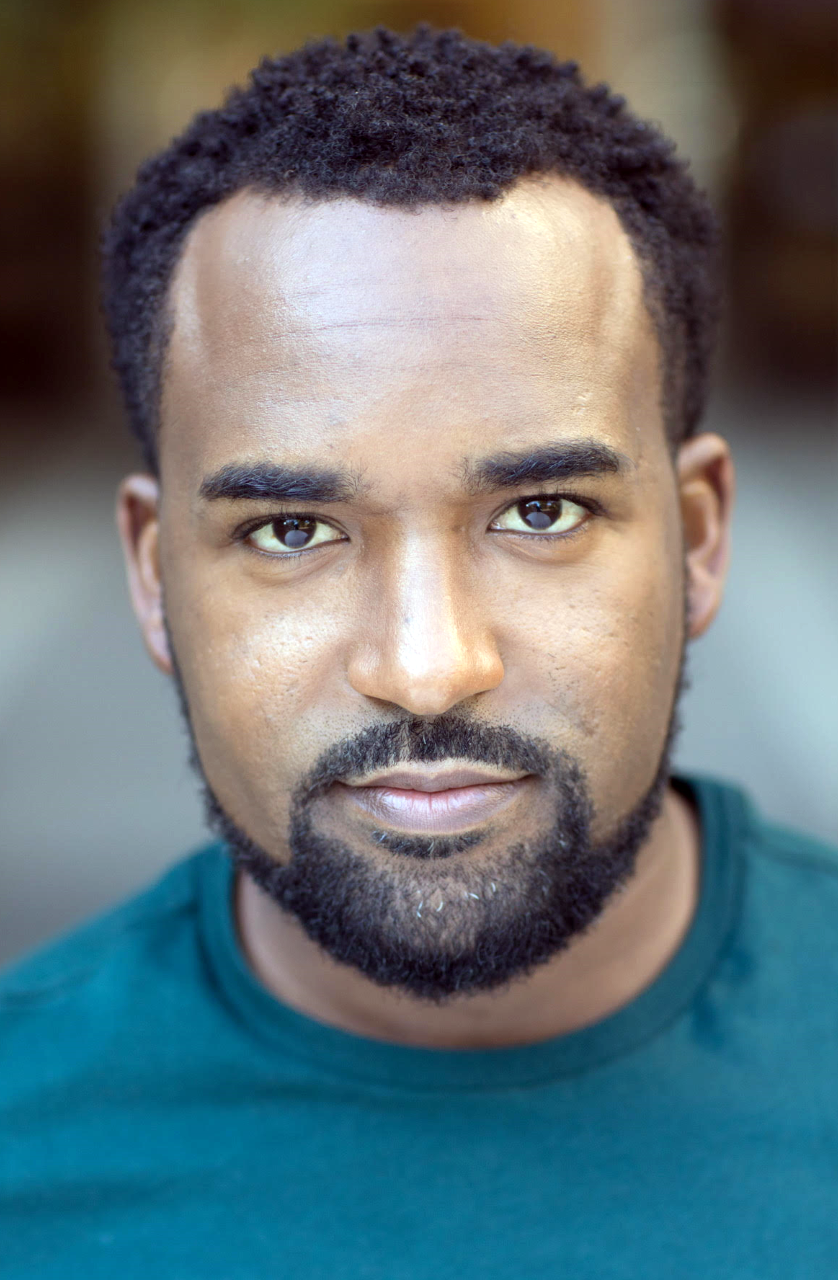
Sam Thomas (Andre G. Brown), an African American physician, is an odd spectacle of the ordinary doctor. He performs illegal abortions and supports Delia Patterson (Saleemah Sharpe) with her family planning movement; more of a party animal, Sam spends most of his nights drinking and carrying on in clubs. Having a reputation for being wild, he finds himself settling down when he falls in love with the conservative Delia Patterson.

Finally, and most importantly, Leland Cummingham (Heinley Gaspard) is an Alabama native who turned up in Harlem, New York, after the devastating death of his beloved wife, Anna, and their son. He is a man of tradition and religiosity; abortion should never happen, women should submit to their husbands, and homosexuality is an “abominable sin.” Finding out that Guy (Jamar Jones) is gay, he becomes furious, and the southern representation of men comes to center stage.
The Mirror of Abortion: 1930 to 2022
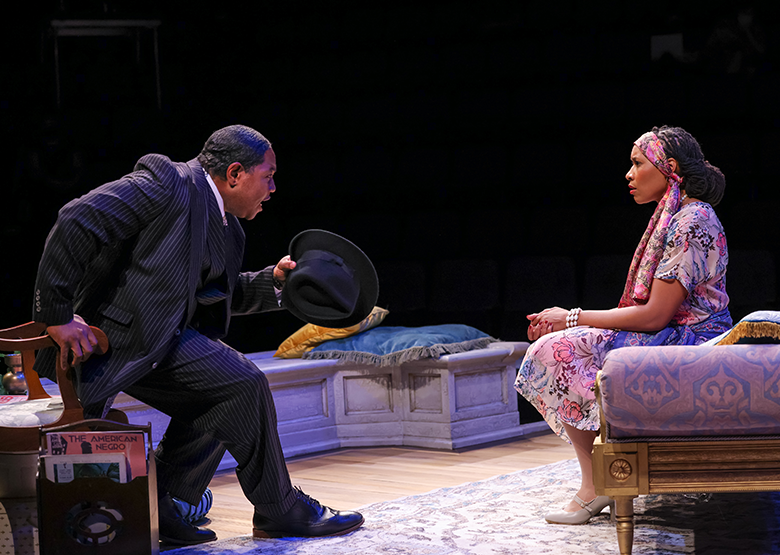
Cleages production manages to create a climax of the show that deeply grasps the audience’s attention. The theater becomes a mirror to society; the troubles lurking around abortion rights in the 1930s represent what the country is experiencing today in 2022. Since the overturn of Roe v. Wade on June 24, 2022, the rights to a woman’s body have become controversial; the threat to abortion rights in the US reflects the same struggle of Angel wanting an abortion in “Blues for an Alabama Sky.”
Becoming pregnant with Leland’s child, Angel makes a heart-wrenching decision to achieve her dream of freedom; finally, realizing that she doesn’t want to marry the Alabama man and give birth to his children, she decides to “take care” of the problem. However, during the 1930s, abortion was extremely limited and illegal; while the laws weren’t as extreme as they once were, the overturn of Roe v. Wade prohibits women from getting legal abortions in certain states. Unable to face the man who had recently swept her off her feet, she decides to tell him that her abortion was a miscarriage. Upon making the wrong decisions, Angel soon becomes the villain in the story; she breaks Leland’s heart when the truth finally comes out and then loses her friends over an incident that changes her fate forever.
Review
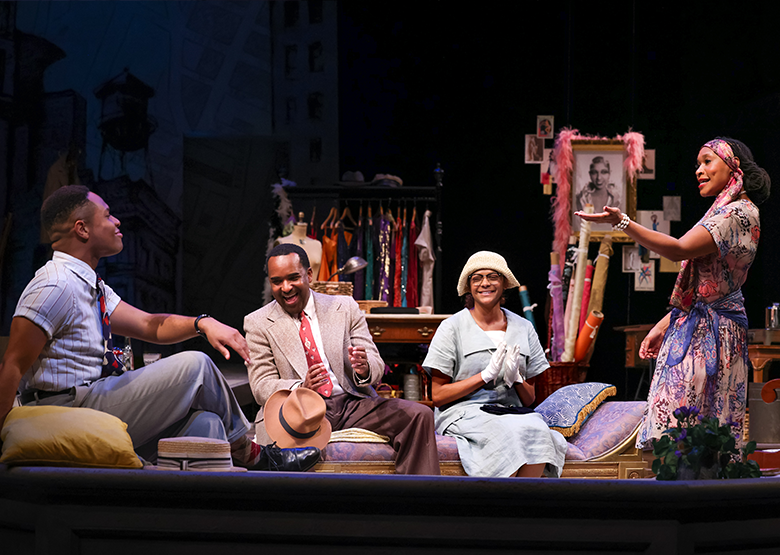
“Blues for an Alabama Sky” was superbly crafted; the cast made every word and expression count – the audience was in hysterics the entire night and left on the edges of their seats. The scenic design crafted by Matthew Smucker was extraordinary; the setup was an accurate picture of New York City in the 1930s. The music, the record player, and the subtle design of the furniture took the audience back into time like we were witnessing our ancestors living their lives. Not to mention, the costumes and hair designs done by Melanie Burgess were clever and serviceable; I was glad that the costumes were not over the top. Coming into the play, I was scared that the wardrobe design would be a false representation; due to the Great Depression, luxury clothes weren’t that common. However, the wardrobe and costume designs were perfect; the hats the men wore, the cigarette smoking, the bright red lipstick, and the beautiful dress Angel wore made the production fascinating and intriguing without giving a false representation of the period. It was as if the actors brought the stage to life – there was not a mere second of impending boredom between the scenes, and the actors made sure to entertain the audience while performing. This is storytelling at its best, perhaps the best production I have seen at Playmakers in Chapel Hill. Rating: 5/5 stars 
Age Requirement
The play is rated PG-13; encourages patrons to use their own discretion in determining the age appropriateness of the material.
Tickets and Show-Times
Individual ticket prices start at $20. For more information and to purchase tickets, call 919-962-7529 or click here. “Blues for an Alabama Sky” will run at Playmakers until Sept. 25.


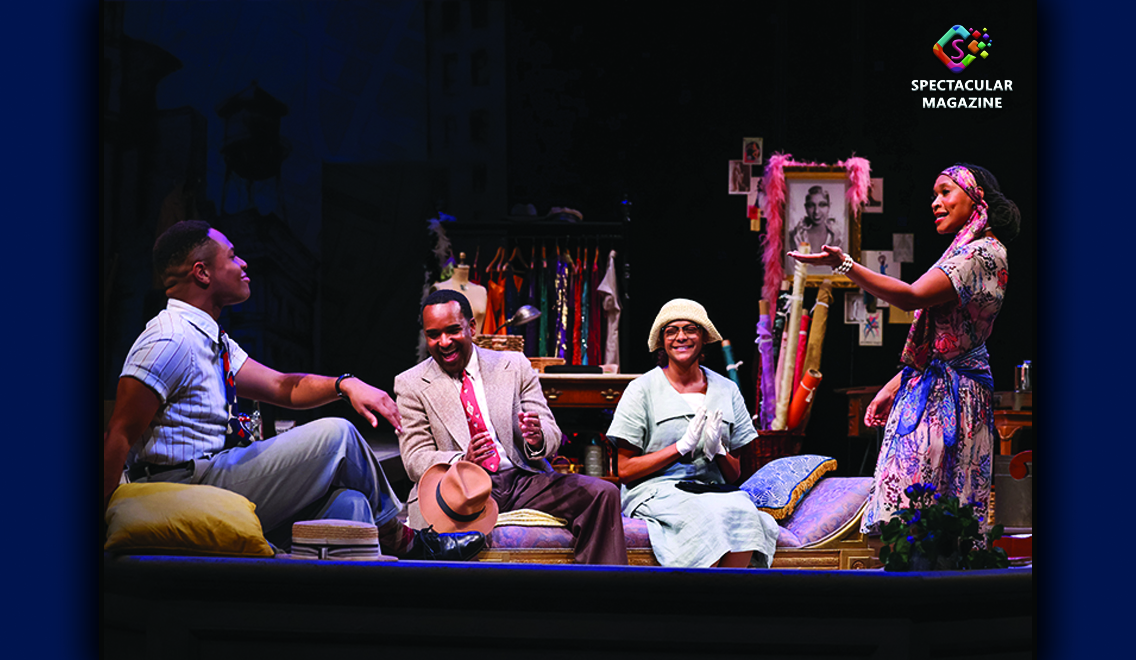
One thought on “(Review) “Blues for An Alabama Sky” At Playmakers: Superbly Crafted (5/5 Stars)”
Comments are closed.